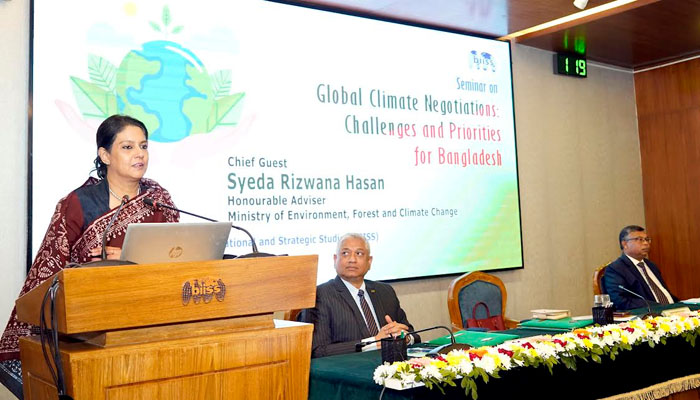Govt to ensure optimum use of climate budget: Rizwana


DHAKA, Dec 18, 2024 (BSS) – Environment, Forest and Climate Change Adviser Syeda Rizwana Hasan today said the government is committed to ensuring the best use of climate budget.
She made the remark while speaking at a seminar titled “Global Climate Negotiation Challenges and Priorities for Bangladesh” organised by Bangladesh Institute of International and Strategic Studies (BIISS) at its auditorium here.
Rizwana highlighted several critical issues in climate governance and Bangladesh’s priorities.
She said the guideline for allocating the Bangladesh Climate Change Trust Fund (BCCTF) has been updated and funds were distributed more cautiously.
She mentioned that international climate funds must be utilised properly to achieve meaningful outcomes, while the ongoing efforts aim to identify priority sectors for climate investments.
The environment adviser, however, warned that without reducing carbon emissions, global environmental damage cannot be mitigated, regardless of increased spending.
She highlighted that various initiatives are being implemented to address Bangladesh’s environmental challenges.
“We must rethink development strategies. If rivers and canals are filled up, how can adaptation efforts succeed? Abandoning a consumerist lifestyle is necessary,” she observed.
About the choking air pollution, Rizwana said a task force has been formed to control air pollution, which will soon begin its activities.
Measures are also being taken against the polluters, and the use of single-use plastics is being discouraged, she said.
The adviser called for a focus on enhancing resilience, securing adequate adaptation funding, and ensuring transparency in fulfilling global commitments.
She stressed equitable negotiations at global forums to amplify the voices of vulnerable communities and ensure that the developed nations fulfill their financial and technological commitments.
BIISS Ambassador AFM Gousal Azam Sarker and BIISS Director General Major General Iftekhar Anis also spoke.
Several power-point presentations were made at the seminar focusing on geopolitics of climate negotiation, global climate finance negotiation, loss and damage, and climate diplomacy.
The seminar brought together policymakers, researchers, climate experts, and diplomats to discuss pressing issues, including inadequate climate finance, slow progress on loss and damage mechanisms, and the need for stronger mitigation targets from major emitters.

